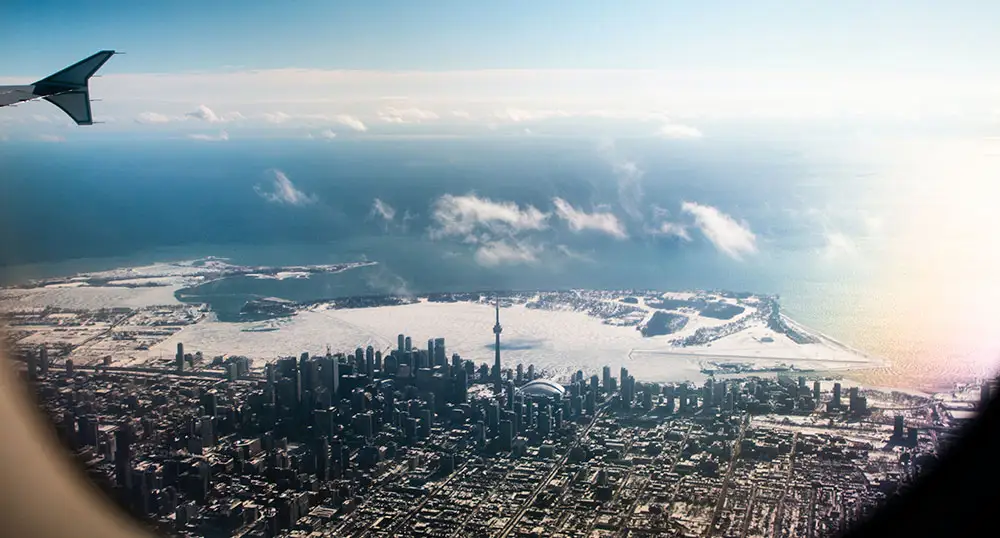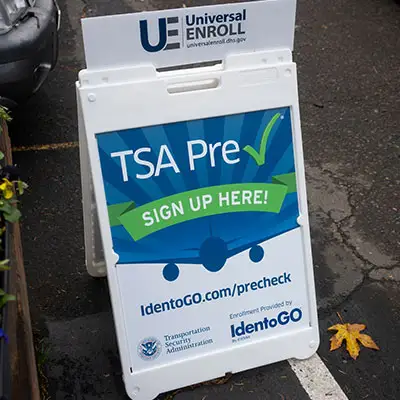10 Travel Hacks to Reduce Holiday Flight Delays and Stress
Travel Team | Nov 1, 2023

Holiday travel doesn’t appear to be slowing down any time soon, and we don’t blame you. We wouldn’t want to pass up on a chance to see loved ones, celebrate the season, and enjoy some time away from home, either. But we also wouldn’t blame you if recent flight troubles are causing you to rethink your holiday travel plans.
As if we needed to be reminded, the U.S. Department of Transportation reported a flight cancellation rate of 3.2% through the first six months of 2022, the highest it’s been in several years. While some of the most problematic stretches happened during holiday weekends, the Labor Day weekend in September actually had relatively few hiccups. That has us hopeful for the 2022 winter holiday travel forecast.
Even if airlines iron out all the recent wrinkles, however, holiday travel always poses risks. There are higher volumes of air travelers, a greater chance of inclement weather, more people who simply aren’t used to flying, and passengers have other things on their mind, making them distracted and forgetful. Some of these holiday travel mistakes we can help with. Here are 10 ways to make it easier to fly during the winter holiday season.
How to Reduce Flight Delays and Other Tips for Easy Holiday Travel
1. Fly at the right time.

Finding the most inexpensive flight, especially at holiday time when it seems like your wallet is always empty, can be tempting. You should absolutely look for deals, but remember that some times are better for flying than others. We tend to see fewer delays for early-morning flights, whereas red-eye flights tend to be less crowded. Consider all your options before clicking the purchase button.
Mondays, Thursdays, and Fridays became the busiest travel days in 2021, more even than the weekends. You might be able to avoid some crowds, not to mention find better ticket prices, by picking less popular days to fly.
Finally, pay attention to the departure time of connecting flights. It’s a good rule of thumb to give yourself at least an hour between connections. During the busier holiday season, it can’t hurt to allow an even bigger buffer of time, just in case.
2. Download the best travel apps.
While there are countless apps that make travel easier, cheaper, and safer, there are a few that focus on making flying significantly better.
- Hopper: Find the best price on flights, and track price trends to decide if you should buy now or wait.
- Grab: When you need to eat but your connection is cutting it close, you can order through the app and have your food from certain restaurants in certain airports ready when you get there.
- FlightAware: If you aren’t using your airline’s app, FlightAware can help you track whether your flight is on time or if your gate has changed. Friends and family can also track your flight in real time to know when you’ve arrived.
- Calm: Nervous flyers and those feeling the holiday stress in general will appreciate meditation and breathing practices to help restore peace to your mind.
- WhatsApp: Talk or text with friends no matter where everyone is — even internationally — for free. You can also use it to contact Seven Corners if you need travel assistance during your trip.
- Seven Corners app: When you purchase Seven Corners travel insurance, download the app where you’ll find your plan information and ID card, and if necessary, submit claim information.

3. Look for cost-saving measures.
Christmas flights are expensive, no matter when you book them or what secret codes you use to try to get a deal. While you might not be able to save much money on the flight itself, there are other ways to save money when you fly.
First, when booking your tickets, figure the cost of checking luggage into your overall flight cost. A friend recently found that because he was planning to check two bags, upgrading to first class, where checked bags were included in the price, would cost nearly the same as an economy ticket and paying separately for bags. This isn’t always the case, but especially if you plan to check an extra suitcase with gifts, a bit of simple math might pay off.
Second, if you must pay for checked luggage, look for ways to reduce the number of bags you’ll check. Mail gifts to your destination instead of carrying them through the airport.
Third, and this goes for any time of year, pack your own snacks and meals. It’s no secret that airport food is expensive, so if you can bring cheaper (and healthier) snacks from home, you’ll come out ahead. Remember that you’re restricted in the amount of liquid you can bring through airport security, though. We recommend putting an empty reusable water bottle in your carry-on and filling it near your gate. If you’re bottle- or breastfeeding an infant, that is not subject to the same TSA restrictions as other liquids, and you can bring it all through security. Be sure to check out our other tips for flying with a baby and nursing at airports.
4. Apply for TSA PreCheck.

One of the most nerve-wracking parts of flying at holiday time is getting through airport security. The lines are longer, people are usually wearing more layers and shoes that are harder to take off, and it just feels more chaotic. Bypass it all by getting TSA PreCheck before you travel.
5. Know what you can bring on the plane.
Scroll through TSA’s Twitter feed around the holidays and you’ll find an amusing list of passenger questions about what they can carry on a plane. Eggnog? Wrapped gifts? Leftover Thanksgiving turkey and gravy? Ski poles? Do yourself a favor and research what items must be checked in your luggage and what can be carried on. It will make it easier to get through the security line quickly and you won’t be stuck throwing out those cherished homemade Christmas cookies you planned to give your mom. You can find many of these items on the TSA website, or simply ask them on Twitter. I’ve always gotten a response within a day.
6. Pack self-care items.
Cramped seats and long waits can bring out the Grinch in even the most excited air travelers. Give yourself a holiday gift by building a personalized self-care package for the trip. Stock it with snacks, cozy socks or slippers, eye mask and earplugs for easier napping, a mild pain reliever for headaches or muscle pains, lip balm, hand sanitizer, facial cleansing wipes, miniature deodorant and mouthwash, and a small brush or comb. Just make sure it’s all TSA-approved and brings you some fresh-feeling joy when you land.
7. Choose recognizable luggage.
Story time: A few years ago, I traveled in December with a group of friends. We teased one of them mercilessly for carrying his grandfather’s outdated, old-school suitcase rather than a “cool” backpack. When a snowstorm delayed our return home and re-routed us through different airports, we thought it would be days before we saw our bags again. We got in the monstrously long line to file a lost luggage claim, only to look over to the nearby pile of random bags and see his suitcase, the one that stood out for being notoriously ugly. It saved us hours, possibly longer.
The moral of this story is that recognizable luggage — beyond sticking a red ribbon on the handle — can make it easier to identify your belongings and get on with your trip.
8. Give yourself extra time.

Lines that stretch longer than usual, icy roads, and unfamiliar airport parking lots all add up to be time consuming. We can expect airports to be even more hectic during the 2022 holiday season, too. Some of the largest airlines have cut the number of flights available in November and December, meaning people will be vying to get on fewer planes and making gates and security lines feel more claustrophobic.
Build extra time into your itinerary so you aren’t overly stressed about making your flight … or standing at the gate as you watch your plane pull away.
9. Know what to do if your flight is significantly delayed or cancelled.
Much depends on why your flight was delayed or cancelled. For example, was there a blizzard or did the plane have mechanical issues? Regardless of the reason, there are a few general steps you can take when you’re asking, “What should I do if my flight has been cancelled or delayed?”
All the major airlines will rebook you on the same airline at no additional cost, and a few will rebook you on a different airline, although there may be fees associated with that. If you’re already at the airport, queue in line to reschedule your flight. You might also call the customer service line while you wait, as they may be able to help you more quickly. In either scenario, please remember to be kind and patient with airline employees.
When you experience a significant flight delay or cancellation and start paying more for your trip — for a different flight, meals, ground transportation, hotels — save the receipts. If you can be reimbursed for those expenses, having the receipts will help you get the maximum refund possible.
Do airlines compensate for delayed or cancelled flights?
According to the U.S. Department of Transportation, airlines are required to refund a ticketed passenger if the airline cancels the flight or makes significant changes in the flight, and the passenger chooses not to accept an alternative. In other words, if the airline cancels your flight and you decide not to rebook to another later flight, you are entitled to compensation in the form of a refund.
How long does a flight have to be delayed before compensation?
In light of the “flightmare” conditions many air travelers experienced in the first half of 2022, airlines made some additional commitments for controllable cancellations and controllable delays. A controllable cancellation or delay is one caused by the airline, such as maintenance or crew problems, or baggage loading. Some of the commitments are effective after a delay of three hours or more, while others go into effect if there’s an overnight delay. You can see a list of the commitments and which airlines adhere to them on the U.S. Department of Transportation’s Airline Customer Service Dashboard.
10. Protect your trip with travel insurance for flights.
You might have noticed above that airline commitments and accommodations are generally for “controllable” delays and cancellations. The airline might not compensate you for reasons such as weather or illness. That’s why purchasing travel insurance is still so important.
Many trip protection plans include coverage if you must cancel or interrupt your trip for covered reasons, or if your trip is delayed for a covered reason, some of which go beyond what’s listed in an airline’s policy. You can also add optional Cancel for Any Reason (CFAR) coverage, which allows you to cancel your trip for any reason you wish. This includes changing your mind about traveling, fear of travel, and more not listed in your trip protection plan or an airline’s cancellation policy.
It’s also important to remember that even if the airline can refund you for a delayed or cancelled flight, they won’t cover lost expenses for hotels, excursions, and other prepaid trip costs at your destination. Travel insurance, however, can.
Fly the Friendly, and Festive, Skies this Holiday.
Protect your flight, excursions, hotel accommodations, and more with the best travel insurance for holiday getaways. There’s too much joy to be had to risk leaving it to chance or to those who aren’t experts in protecting your trip. Talk with one of Seven Corners’ licensed travel insurance agents today.
Email sales@sevencorners.com
Toll free 1-800-335-0611
Worldwide 1-317-575-2652
Collect 1-317-818-2809
Search Posts
Receive our monthly inspiration and travel tips from the travel insurance experts.
Sign me upThis website and various social media updates provided by Seven Corners contain content, information, articles, videos, and links to websites created by third parties. Seven Corners, its owners, and its employees neither endorse nor are responsible for the accuracy, timeliness, or reliability of any third-party information, statements, opinions, or advice and are not liable for any loss, harm, or damage caused by your reliance upon them. Use of such information or the linked websites is entirely at your risk. Concerns regarding this third-party content should be directed to the third party. Seek professional advice, as appropriate, regarding your use of such information and websites.
Because the information on this website and in Seven Corners’ blogs and other social media is written and compiled using knowledge and information available at a certain point in time, it may become outdated. For that reason, information, events, legal requirements, and product changes (including benefits, limitations, exclusions, and services) may not be up-to-date, complete, or accurate at the point in time it is being read. Again, use of such information is at your risk.
